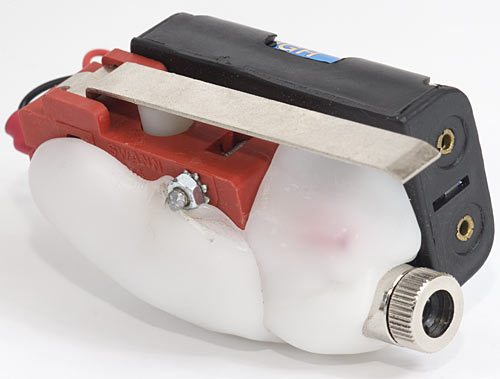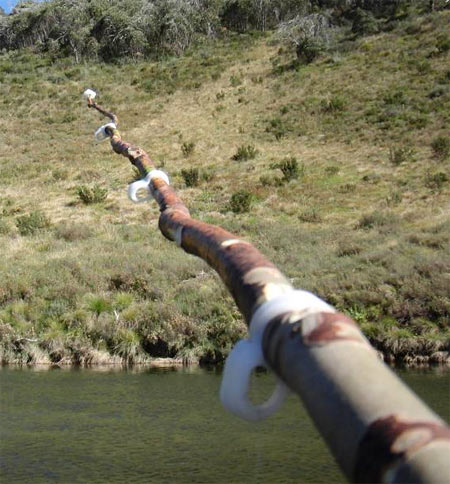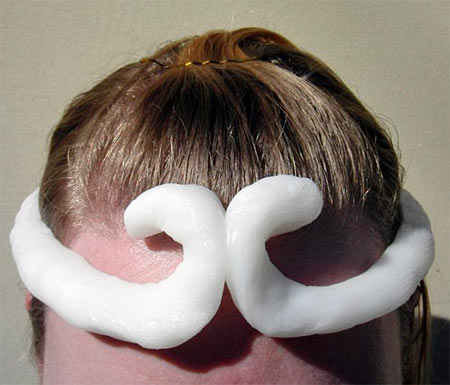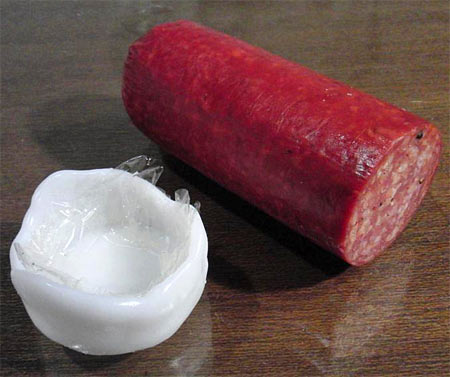If you're not in Australia, and not interested in polycaprolactone, this post is not for you.
Regarding that second criterion, though, I think pretty much everyone should be interested in polycaprolactone. I'd actually go so far as to say that every home should have some, even if you're not at all "handy". Just put it in that kitchen drawer with the screwdriver, the hammer, the dried-up epoxy and the random screws and washers.
Well, put it there when you've finished playing with it, anyway.
As I explained in this rambling 2010 post about the construction of...
...this, um, thing, polycaprolactone (which is sold under several easier-to-remember brand names) is a remarkable substance.
It can be moulded like rather sticky, see-through clay when hot (its melting point is about 60°C, but it's comfortable to handle at quite high temperatures, thanks to low thermal conductivity). When it cools, it turns into a smooth opaque white plastic about as strong, and tough, and easy to shape with other tools, as nylon. You can use it to do anything you could do with nylon, except of course withstand temperatures above 60°C.
And, unlike Sugru and various other putties and clays, polycaprolactone is reusable - just heat it up again. It'll also last forever on the shelf, and isn't even toxic, unless you set it on fire and inhale deeply.
You need hot water to soften polycaprolactone, but that's the only thing remotely dangerous or difficult about this stuff. Any child old enough to boil water without supervision can use polycaprolactone to make, fix or modify things. Because you can reuse it as much as you like, polycaprolactone is also an excellent do-it-yourself material for klutzy adults.
I spent a while in the 2010 post talking about where to find polycaprolactone, and what it cost. At the time, it wasn't hard to find the stuff here in Australia, but it was a bit expensive.
Now one Peter Edmunds, the proprietor of plastimake.com, is selling polycaprolactone locally for good prices.
Plastimake-branded polycaprolactone comes as the same white granules as pretty much every other brand. ("Friendly Plastic"-branded polycaprolactone is rather more expensive, but can be had in numerous colours and finishes.) As I write this, there are only two package sizes available from Plastimake; a hundred grams is $AU10 including delivery anywhere in the country, and 800-gram jars are $AU30, plus a flat fee of $AU10 delivery for as many jars as you like. They accept PayPal or credit cards for payment.
(Plastimake sell on eBay as well. Prices are the same.)
For comparison, Jaycar are still selling Polymorph-branded polycaprolactone in Australia. Their pricing starts at $AU11.50 for 100 grams - plus delivery, if you're buying mail-order - and drops to $AU8.95 per hundred grams if you're buying a kilo or more.
So if you're building your own Plastic Pal Who's Fun to Be With and want four kilos of the stuff - which is quite a lot, because polycaprolactone is only slightly denser than water - Jaycar will relieve you of $AU368 including road-freight delivery, versus only $160 delivered from Plastimake.
The UK eBay dealer (on ebay.com, on ebay.co.uk) that I recommended in the last post is still selling Polymorph-branded polycaprolactone, too. A kilo from them is £15.10 (about $AU23, as I write this) plus international delivery, which currently isn't specified for this largest size. If four one-kilo bags cost the same to send to Australia as four kilos worth of their 750-gram bags, though, the delivered price for four kilos would be about a hundred quid, or $AU153.
So Plastimake are ahead by a bit for small amounts - and if you've never played with polycaprolactone before, a hundred-gram bag will be plenty to give you the idea - and they charge about the same for large amounts delivered to Australian customers as the best eBay dealer I've found.
(If you want to place a really big order, you can also contact Plastimake for a further discount.)
Plastimake have a good site, too. In addition to the usual simple instructions, there's a big page of example projects, containing the various simple repair projects you'd expect, plus...
...eyelets for a rustic fishing rod...
...an item of headwear which many Australians will recognise...
...some quite impressive sculptures...
...and that most prosaic of all kitchen accessories, the form-fitted salami cap.
Plastimake also have a page of techniques, including colouring the plastic (as seen in the rose sculpture), making thin sheets, and alternative heating techniques.
Plastimake are brand new, so I suppose it's possible that Peter Edmunds will turn out to take your money and run, or something. Presuming he is not a rip-off artist or crazy person, though, there's really no excuse any more for Australians to remain polycaprolactone-less.
The stuff really is very fun, very useful and very easy to work with, and it tremendously appeals to the large penny-pinching lobe of my brain. It'll never go stale or dry out, and if you drill or carve something you've made out of it, you can collect and reuse even tiny shavings.
Highly recommended.





13 April 2012 at 6:35 pm
Now you need to sell something so crappily made it can be featured on Regretsy.
13 April 2012 at 9:05 pm
How do you get the stuff to 60 degrees C on Pluto?
15 April 2012 at 5:43 am
Must...Resist....buying...Oh, only sells within Aus. Guess that makes it easier to resist if they won't send to NZ.
15 April 2012 at 3:20 pm
Hey TwoHedWlf, we can't yet do international shipping through our website, but if you get in touch directly I'll happily send your order to NZ with cost price postage. http://www.plastimake.com/contact
Why resist? ;)
17 April 2012 at 1:27 pm
Curse you and your gadget pimping ways!
18 April 2012 at 1:55 pm
Fortunately, it is quite easy to use PCL to make a custom-fit knuckleduster, or short dagger that won't show up on a metal detector. Adroit use of these items can make you your money back in no time!
27 April 2012 at 8:37 pm
Thanks for this Dan - wife bought me some for my birthday (well, I grunted and pointed at the screen and she took the hint).
My pack arrived last Monday - prompt shipping and pretty direct customer service, which is nice. He even threw in an extra bag which is nice :-)
Although it comes in vanilla only, there's a (brief) section on the site about colouring it yourself:
http://www.plastimake.com/technique/colouring
19 June 2012 at 1:21 am
I find a resource that materials here, a very cheaper one,
http://www.alibaba.com/product/hk1007460493-124177846-103369903/productdetail.html?f=myalibaba
19 June 2012 at 1:19 pm
That listing does indeed offer polycaprolactone pellets for as little as $US13.70 per kilo, but the minimum amount appears to be twenty kilos, and it's FOB... Guangdong?
Since it's just "FOB" with no specified location, I presume buyers have to arrange their own collection and shipping from China or get the seller to do it for them, all of which is likely to be difficult to impossible for anybody who doesn't already buy stuff in wholesale bulk from China. Alibaba.com is of course a B2B outfit; they're set up to wholesale to resellers, not to end users.
So I'll leave your link there. It's not just spam, and could be a good lead for someone thinking of setting up their own polycaprolactone-selling business, or who needs a really large amount of the stuff for whatever reason. But I don't think it's fair to compare that seller to actual retailers.